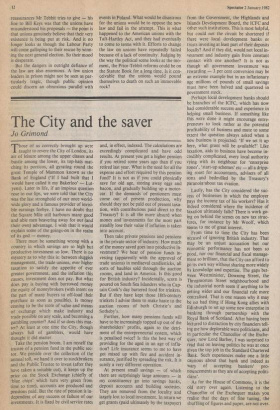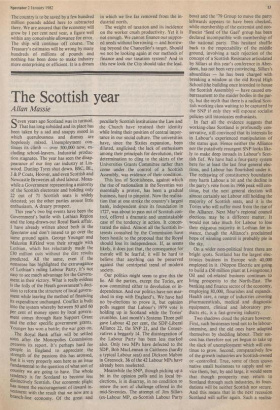The City and the saver
Jo Grimond
Those of us correctly brought up were taught to revere the City of London, its air of leisure among the upper classes and bustle among the lower, its top-hats mat- ching its porticos, all gyrating round the great Temple of Mammon known as the Bank of England (`lf I had built that I would have called it my Bakerloo' — Lut- yens). Later in life, if an impious question rose to our lips, we were told that the City was the last stronghold of our once world- wide glory and a famous provider of invisi- ble earnings forbye. I have no doubt that the Square Mile still harbours many good and able men beavering away for our (and their own) advantage. I wish that it would explain some of the goings-on in the realm of its god — money.
There must be something wrong with a country in which savings are so high but productive investment so low. There is no mystery as to why this is: between sluggish management, the trade unions, ever higher taxation to satisfy the appetite of ever greater government, and the inflation this causes, investment does not pay. But what does pay is buying with borrowed money the equity of moneybrokers (with intent on the part of many buyers to off-load their purchase as soon as possible). Is money ceasing to be the store of value and means of exchange which make industry and trade possible on any scale, and becoming a gambling counter? And if so does this mat- ter? At least at one time the City, though always full of gamblers, would have thought it did matter.
Take the pension boom. I am myself the trustee of a pension fund in the public sec- tor. We preside over the collection of the annual toll, we hand it over to stockbrokers and the Public Trustee to invest (after they have taken a suitable cut), it keeps up the price on the Stock Exchange (chiefly of `blue chips' which turn very green from time to time), accounts are produced and pensions paid. But the rate of pension is in- dependent of any success or failure of our investments. It is fixed by civil service rates
and, in effect, indexed. The calculations are exceedingly complicated and have odd results. At present you get a higher pension if you retired some years ago than if you retired last year. What is the need for all the expense and effort required by this pension fund? It is not as if you could physically save for old age, storing away eggs and bacon, and gradually building up a motor- car. If the demands of pensioners must come out of present production, why should they not be paid out of present taxa- tion, with contributions paid direct to the Treasury? It is all the more absurd when money and investments for the most part steadily lose their value if inflation is taken into account.
Then take private pensions and pensions in the private sector of industry. How much of the money saved goes into productive in- vestment? We hear of pension funds in- vesting (apparently with the approval of trade unions) in mediaeval candlesticks, all sorts of baubles sold through the auction rooms, and land in America. Is this good for British industry? Incidentally, scorn is poured on South Sea Islanders who in Cap- tain Cook's day bartered food for trinkets. But if they have kept those 18th-century trinkets I advise them to make haste to the auction rooms of both Christie's and Sotheby's.
Further, how many pensions funds will have to be increasingly topped up out of the shareholders' profits, again to the detri- ment of the entrepreneurial system, which is penalised twice? Is this the best way of providing for the aged in an age of infla- tion? Life insurance seems to me to have got mixed up with fire and accident in- surance, justified by spreading the risk. It is surely a very different operation.
At present small savings — of which there are surprisingly large amounts — in my constituency go into savings banks, deposit accounts and building societies. They are removed from the locality and largely lost to local investment. In return we get grants (paid ultimately by the taxpayer) from the Government, the Highlands and Islands Development Board, the ICFC and other such institutions. This is most helpful, but could not the circuit be shortened if there were local development banks or trusts investing at least part of their deposits locally? And if they did, would not local in- vestment and industry gain from constant contact with one another? It is not as though all government investment was rewarding — 3 per cent conversion may be an extreme example but in an inflationary age millions of pounds of small savings must have been halved and quartered in government stock.
Perhaps local development banks should be branches of the ICFC, which has now had considerable success and experience in helping small business. If something like this were done it might encourage entre- preneurs to look rather at the potential profitability of business and mute to some extent the question always asked when a new business is projected: `If we set it up here, what grant will be available?' Like taxation, aids to business have become in- credibly complicated, every local authority vying with its neighbour for 'enterprise zones', 'start-up schemes' etc — all a dripp- ing roast for accountants, advisers of all sorts and bedevilled by the Treasury's paranoia about tax evasion.
Lastly, has the City considered the suc- cess of businesses in which the employer pays the income tax of his workers? Has it indeed considered where the incidence of taxation ultimately falls? There is work go- ing on behind the scenes on new tax struc- tures, for instance by Mr Woolf, which seems to me of great interest.
From time to time the City has been accused of ignoring British industry. That may be -an unjust accusation but our economic performance has not been so good, nor our financial and fiscal manage- ment so brilliant, that the City can afford to go its own way without sharing more widely its knowledge and expertise. The gaps bet- ween Westminister, Downing Street, the Throgmorton Street neighbourhood and the industrial north seem if anything to be getting wider and our financial rule more centralised. That is one reason why it may be no bad thing if Hong Kong allies with Edinburgh to set up some new enterprise in banking through partnership with the Royal Bank of Scotland. After having been lectured to distraction by city financiers tell- ing me how deplorable were politicians, and in particular the Chancellor of the Exche- quer, now Lord Barber, I was surprised to read that on leaving politics he was at once given the top job in the Standard Chartered Bank. Such experiences make one a little cautious about that bank and indeed as wary of accepting bankers' pro- nouncements as they are of accepting politi- cians'.
As for the House of Commons, it is the old story over again. Listening to the Chancellor of the Exchequer makes you realise that the days of fine tuning, the shuffling of figures and paper, are not over. The country is to be saved by a few hundred million pounds added here to subtracted there. We are assured that the economy will grow by 1 per cent next year, a figure well within any conceivable allowance for error. The ship will continue off course. The Treasury's estimates will be wrong by many hundreds of millions of pounds and nothing has been done to make industry more enterprising or efficient. It is a dream in which we live far removed from the in- dustrial north.
The weight of taxation and its incidence on the worker crush productivity. Yet it is not enough. We cannot finance our suppos- ed needs without borrowing — and borrow- ing beyond the Chancellor's target. Should we not be looking again at our methods of finance and our taxation system? And in this new look the City should take the lead.



































 Previous page
Previous page